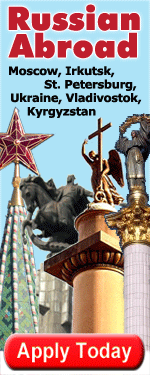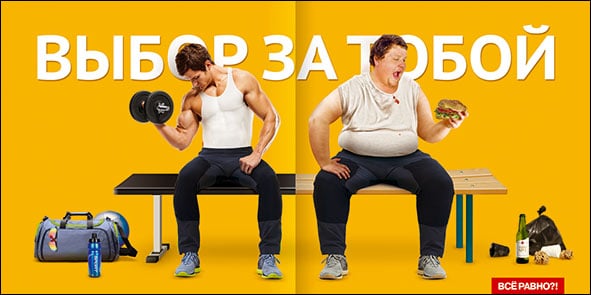This bilingual resource hopes to build students’ vocabulary skills as well as provide them with a window into concepts of health and fitness as viewed from Russian-speaking societies.
Hover over the bold Russian to reveal its English translation.
The Language of Gyms in Russian
The in Russia can also be called, colloquially, “качалка.” “Качалка” is derived from the Russian verb . However, “качать” can also mean “to pump” or “to exercise” – as in ““. Gyms are becoming more and more popular among Russians. Moscow has plenty of gyms at different prices, but other big cities, such as Yekaterinburg, still lack gyms as the market is still developing.
As a visiting foreigner, if you decide to , it would be wise to ask, ““. Some gyms only have , and thus might be “overkill” for someone looking for a one-semester commitment.
Some gyms have a large (for example, of 32,000 rubles – or about $1,000 for six months) but don’t charge monthly fees. The minimum charge then might cover access to some facilities like , , , , , and .
Smaller gyms, especially those located in , are often more affordable. These might offer for about 3000 rubles. However, they are less likely to have or , and additional services are more limited, although, for example, finding a and тренировка is generally possible at such facilities at extra cost (often about $20-30 per session).
A newcomer should ask, ““. Many gyms do not have any, and if , they are quite small. Some discounts that do occur include: ; ; ; ; some gyms might even offer which might be good for on your birthday. Some gyms offer discounts for attending дневное время – when most people are in offices rather than at the gym. In Russia, в дневное время are more widely practiced in swimming pools than in gyms.
A newcomer may ask gym employees, ““, since some group workout sessions are . Such extra sessions can include , , , , and .
, might want to ask about personal trainers. “” or . Some trainers are quite qualified, they can be кандидат в мастера спорта or , and have .
Another good question to ask is: ““. Most gyms operate from early morning till evening, and close at night.
There are two types of fitness equipment: , such as , , , , and ; and , such as and . When , kilograms are used, so a Westerner should be able to convert the weight from kilos to pounds by multiplying the kilos by 2.2.
Sport was highly valued in the USSR and many Russians take sport and physical fitness very seriously. Many of the old training halls are very Spartan, but still in use and some are now some of Russia’s most affordable work out facilities. However, the market is growing and maturing now and new, commercial facilities are constantly opening to serve a range of needs and price markets.
Gaining and Losing Weight in Russian
Many words referring to being overweight have positive lexical connotations in Russian. Before the revolution, only the well-to-do could afford enough food to grow plump, and thus it was a sign of success. Throughout Soviet times, the ideal woman was usually presented as a stout working woman. To this day, being heavy remains much less stigmatized in Russian culture than in Western culture. That said, this, like all culturally-sensitive topics, is not one to discuss in reference to someone within earshot unless you know the person very well and are confident you will not offend them with any words you choose.

The word “полнеть” is roughly equivalent of “to fill out” in English, but can be used in Russian to describe even someone who is becoming overweight. The verb’s adjective form: is usually defined as “containing in itself as much as it can or should hold”. and is often used to politely describe “full-bodied” people or those .
The verb “поправиться” also has distinctively positive connotations. In addition to meaning “to gain weight”, it also means “to be cured”, “to have improved health”. Interestingly, it is also not uncommonly used to mean “to take the hair of the dog,” meaning to cure the hangover by taking another drink.
Even the adjective , which is rude to use when referring to people, can carry positive connotations. Ushakov’s Explanatory Dictionary defines it as “saturated with useful substances, juicy,” and gives the example .
Frequently, gaining weight or even being overweight is associated in Russian literature as a sign of being successful and living “the good life.” For example, Ivan Goncharov writes in his An Ordinary Story of Aleksandr, a young man who is living life to the fullest,
Even in harsher instances, the references are often forgiving. For example, in Fathers and Sons, Turgenev writes:
The noun is generally rude, but innocuous enough that there is a chain of “plus-sized” clothing stores in Russia called “” (which is also a reference to a well-known tale in Russian). One would not expect such a store to do as much business if its name were derived from the even ruder or .
It is also interesting to note that a respected Russian last name, one associated with nobility and great authors is “Толстой”, derived from the word “толстый” meaning “fat/overweight”. There is even the last name “Жириновский”, which one of Russia’s best-known politicians, Vladimir Zhirinovsky, adopted for himself, replacing his original, Jewish last name of Эйдельштейн with something more ethnically Russian. Even his supporters sometimes refer to him with the nickname “Жирик” – a diminutive that would also mean “fatty.” It’s even the title of his Russian Wikipedia entry.
In contrast, the last name “Худых”, derived from the word is very rare. Худяков is more common, and is associated with some famous figures (including at least one famous artist and a modern director of music videos), yet undoubtedly pales in fame if compared with Толстой.
The words related to are more frequently given negative connotation.
In literature, is often associated with . In Anna Karenina, Leo Tolstoy writes:
“Tощий” is word that means “thin” but also “empty.” To illustrate uses of its verb form, Dal’s Explanatory Dictionary gives as its first two graphic examples: and .
Another related verb is “тошнить” which means “to purge” or “to vomit” – the result of which, of course, is being .
The word “худой” can also mean “bad” or “cheap.” For example, the saying “худой товар с рук долой”, means roughly “cheap goods should be dropped immediately” (i.e. not purchased). Another (better known) example is .
“Polite” names to refer someone who is thin are also more uncommon in Russian if compared with polite names for someone who is heavy. One example is the relatively innocuous “худенький” which would refer to someone not unappealingly thin. There is also the adjective “стройный” which would refer to someone with a thin, yet still athletic build and is associated with the secondary definitions of “well composed” and “harmonious.”
A ruder version would be to call the person a .
Attitudes toward weight are changing in Russia, with more and more people going to fitness centers on a regular basis, and following the latest diet fads. Today many young girls would like their boyfriend to be and , and guys prefer to have a . Meanwhile, a large percentage of Russians have a positive attitude towards moderate amounts of excess weight in themselves or other people. As they say, “хороших людей должно быть много” – which is play on words in Russian and roughly means “You can never have too many good people” and “you can never have enough of a good person.”
A Trip to the Gym in Russian
The following bilingual Russian MiniLesson is meant to build your vocabulary by providing an annotated, simplified Russian text for intermediate students of Russian. Hover over the bold Russian to reveal its English translation.
Я хочу быть сильным и иметь хорошую фигуру. А чтобы , нужно регулярно тренироваться. Поэтому я , 2-3 раза в неделю, и – то есть . «Тренажерный зал» на сленге называют (the word also means “rocking chair”).
Я купил на 3 месяца занятий.
Когда я прихожу в «качалку», вначале в раздевалке в . В спортзале есть , можно . Я взвешиваюсь каждый раз, чтобы определить, какой эффект дают тренировки.
Потом иду в зал и , чтобы . Летом могу по стадиону, который находится рядом. Также могу побегать на , , или на . Затем я делаю , и другие .
Потом приступаю к основной части тренировки. В разные дни я делаю упражнения для разных – рук (, ), плечевого пояса (), , спины (), ног и . Это такие упражнения, как , рук с в стороны, рук с гантелями, штанги и многие другие. Если вес штанги слишком велик, когда я делаю , я прошу кого-нибудь .
Есть разные упражнения – на силу, и . Когда я хочу увеличить мышечную массу, я делаю упражнения по 4-6 , по 8-10 в каждом, в среднем и медленном темпе. Каждый подход выполняется – пока мышцы станут неспособны сделать хотя бы еще один .
В упражнениях для улучшения рельефа мышц количество повторений – 15-20 и более, в быстром темпе.
Я надеюсь стать таким же, как мои – известные российские атлеты и российские чемпионы мира Сергей Цикунов, Алексей Себастьянов, Александр Балдин, Дмитрий Золин.
Думаю, что в будущем, когда кто-либо увидит мою фигуру на пляже, он скажет про меня: “Смотри, какой “.


